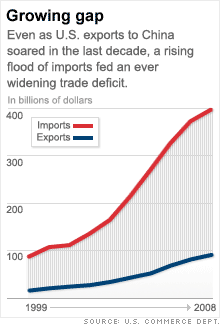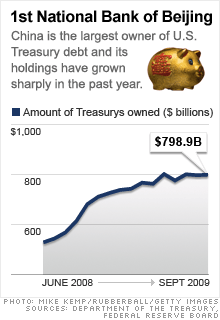Are Chinese exports good for America?
President Obama said better relations with China could help China and the U.S., but critics see little good from a widening trade gap.


NEW YORK (CNNMoney.com) -- As President Obama completes his trip to China, it's a natural time to ask if trade with the greatest source of U.S. imports is a good thing or bad thing for the still battered U.S. economy
Obama said he spoke to Chinese President Hu Jintao about the need for more balanced trade between the two major trading partners. He also urged China to allow the Chinese yuan to gain value against the dollar.
But he also told an audience of students in Shanghai this week that increased trade between the two nations is good for both countries, despite some friction between the two governments. And Obama said he hoped that trade will continue to grow.
"This trade could create even more jobs on both sides of the Pacific, while allowing our people to enjoy a better quality of life," Obama said.
But there are plenty of critics who believe that nothing good comes out of the U.S. trade gap with China, which so far this year has dwarfed the combined gap with the rest of the world by more than a third.
"I think the U.S.-China relationship was the worst economic policy mistake of the last generation," said Scott Paul, executive director of Alliance for American Manufacturing, a coalition of small-to-mid-size manufacturers and some unions which has been a long-time critic of U.S. trade policy.
Paul and other critics argue currency manipulation by the Chinese to undervalue their currency, government subsidies to Chinese manufacturers and low wages paid to Chinese workers have put U.S. workers at an unfair disadvantage.
The Economic Policy Institute, a liberal think tank, estimates that 2.3 million U.S. jobs were lost between 2001 and 2007 due to the Chinese trade gap.
University of Maryland professor Peter Morici has written that this trade gap "threatens to torpedo the economic recovery and keep unemployment above 10 percent for the foreseeable future."
But others argue that even if there needs to be some changes in U.S.-China trade policy, the U.S. economy benefits more than it is damaged by the relationship.
Gary Hufbauer, senior fellow at the Peterson Institute for International Economics, said that there is little evidence to support that trade gaps lead to big increases in job losses.
"If it was a cause of unemployment, why wasn't unemployment rising from the late 90's all the way through to today as Chinese imports rose," he said.
Jay Bryson, global economist with Wells Fargo Securities, added that even though the growing trade gap has caused some harm to the U.S. economy, there are plusses that should not be overlooked.
"It doesn't mean that every person in the United States benefits, but from a national perspective it's a positive," said Bryson.
Bryson and Hufbauer both said that lower priced Chinese goods reduces the cost of living for American consumers, giving them more money to spend on other goods and services.
Bryson said limiting Chinese imports through tariffs or other barriers would raise the price of those goods.
"While it would protect the jobs of some people making toys or shirts here, it would cost other jobs because we wouldn't have the money to spend on other goods and services," Bryson said. "If I'm spending more on toys for my kids or my shirts, I have less money to go to the movies or go out to a restaurant."
Hufbauer conceded that the Chinese yuan is grossly undervalued. But he said there is reason to hope for some change on that front.
China has pegged its yuan to the dollar, rather than letting it trade freely like other currencies. So it has been declining as the dollar has lost value in recent months.
The decline in the yuan means that other countries in Asia and Europe are starting to pressure Chinese leaders to allow their currency to trade more freely. And strong economic growth in China, coupled with the declining dollar, is creating inflation risks for China.
So the Chinese may start to relent on the yuan due to their own self interest, rather than American pressure.
"Once there is some evidence the global recovery is more sustainable, the Chinese worries about inflation are likely to mean they'll allow [the yuan] to appreciate versus the dollar," said Bryson. ![]()


